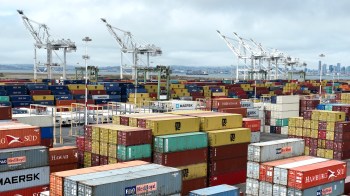The big stories on the Big Three
TEXT OF INTERVIEW
Renita Jablonski: It seems the problems in the housing market and soaring energy costs are leaking into every industry imaginable. And of course, that drip is helping to slow down the engines of the country’s already struggling automakers. Three decades ago, the so-called Big Three controlled almost 85 percent of the U.S. market. But now, foreign companies like Toyota, Honda and Nissan have about half the market.
Marketplace’s Alisa Roth has been following the ups and downs for GM, Ford and Chrysler in 2007, and she’s with us now for a cruise down memory lane. Alisa, I think the biggest surprise for the Big Three was the turn negotiations took this year with the UAW.
Alisa Roth: Yeah, it was funny Renita. Going into the negotiations, everybody expected that these were going to be kind of the warm, fuzzy negotiations — the idea being that the auto workers can’t afford for the Big Three to go bankrupt, so they would be a little easier on the negotiations, the Big Three couldn’t afford for the workers to strike, because that could push them into bankruptcy. So it was all supposed to be one big, happy discussion. And what we got instead were two strikes.
Jablonski: Yeah, I guess people don’t stay warm and fuzzy for too long when it comes to the issue of paying for health care.
Roth: That’s very true — the health care costs for the Big Three were astonishingly big. So they came up with this solution, the Voluntary Employee Benefit Association, or VEBA. And that’s essentially a trust fund that each of the car makers set up, they put money into it, and then the UAW takes responsibility for it. It used to cost GM $25 more a car than its foreign competitors, so the Hondas and the Toyotas, because of its health costs. And with this VEBA, that gap is going to be only $15.
Jablonski: Wages were a big issue during the negotiations as well. What happened on that note?
Roth: They basically agreed that new workers coming in will have lower wages than the existing workers. Current workers had really fought hard against this, because I think there was a sense that there need to be some solidarity and they needed to make sure that the new guys coming on would be paid reasonably well. But there was just no way that the car makers could keep up the same wages.
Jablonski: And in this dramatic year, there was also a divorce between two big names.
Roth: Yes — the DaimlerChrysler have split out, and more interesting than the name change is the fact that Chrysler was bought by a private-equity firm. So for the first time in decades, the Big Three aren’t all public companies. We saw a little taste of what this might mean during the negotiations, I think that the owners of Chrysler played a little bit more hardball than anybody had expected.
Jablonski: So looking ahead to the new year, I suppose the energy bill that would require car makers to build cars and trucks that would get 35 miles per gallon of gasoline by 2020, that’s going to be the big thing, any predictions there, Alisa?
Roth: I think that the Big Three are just gonna have to figure out how to make more fuel-efficient cars. I think that consumers have already shown that they’re not as interested in gas guzzlers like SUVs or big trucks, and that if the car makers want to sell to American buyers, they’re going to have to find a way to make cars that use less fuel.
Jablonski: Marketplace’s Alisa Roth covered the auto industry in 2007 and joined us to talk about what happened this past year. Thanks so much, Alisa.
Roth: You’re welcome.
There’s a lot happening in the world. Through it all, Marketplace is here for you.
You rely on Marketplace to break down the world’s events and tell you how it affects you in a fact-based, approachable way. We rely on your financial support to keep making that possible.
Your donation today powers the independent journalism that you rely on. For just $5/month, you can help sustain Marketplace so we can keep reporting on the things that matter to you.


















